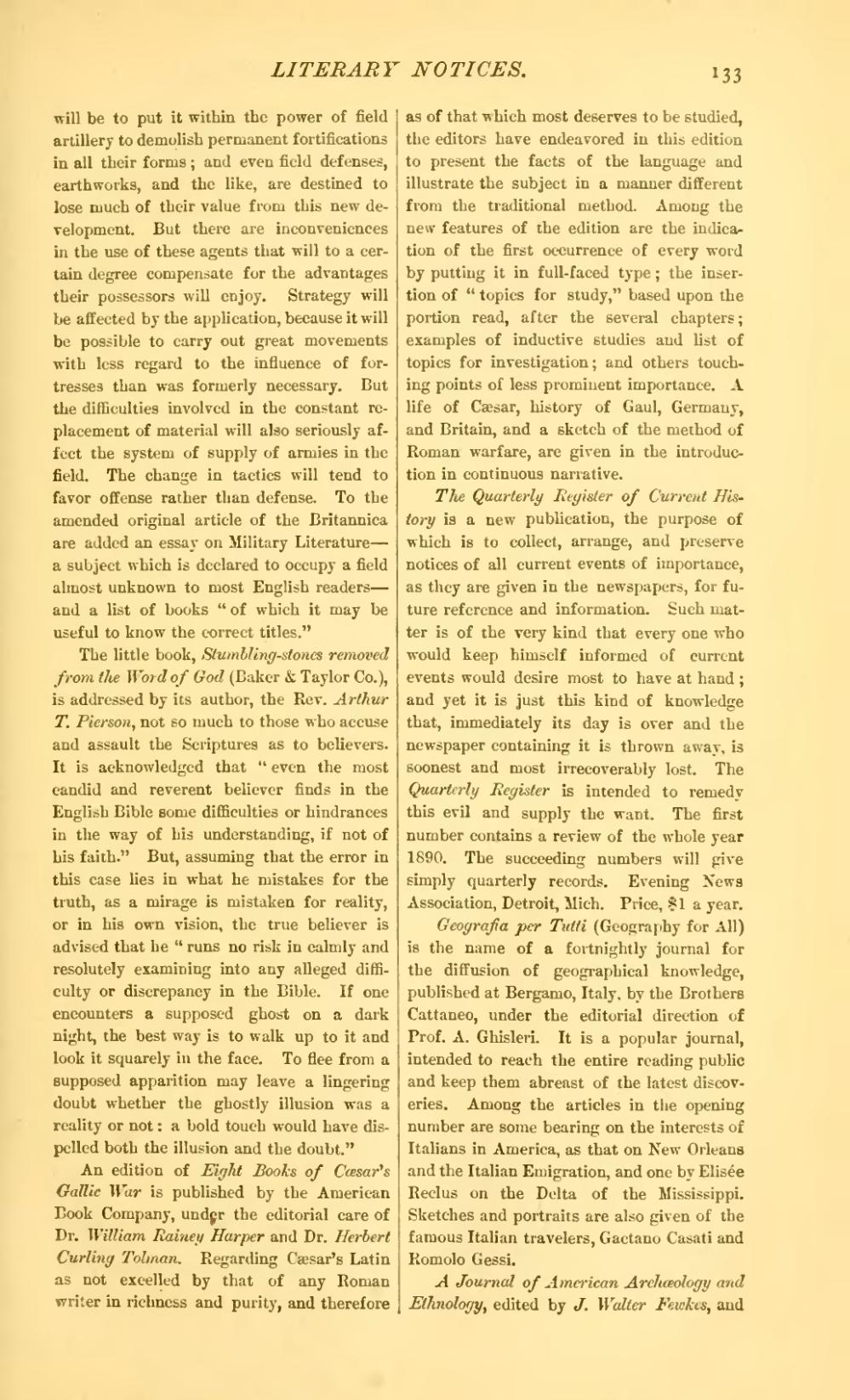will be to put it within the power of field artillery to demolish permanent fortifications in all their forms; and even field defenses, earthworks, and the like, are destined to lose much of their value from this new development. But there are inconveniences in the use of these agents that will to a certain degree compensate for the advantages their possessors will enjoy. Strategy will be affected by the application, because it will be possible to carry out great movements with less regard to the influence of fortresses than was formerly necessary. But the difficulties involved in the constant replacement of material will also seriously affect the system of supply of armies in the field. The change in tactics will tend to favor offense rather than defense. To the amended original article of the Britannica are added an essay on Military Literature—a subject which is declared to occupy a field almost unknown to most English readers—and a list of books "of which it may be useful to know the correct titles."
The little book, Stumbling-stones removed from the Word of God (Baker & Taylor Co.), is addressed by its author, the Rev. Arthur T. Pierson, not so much to those who accuse and assault the Scriptures as to believers. It is acknowledged that "even the most candid and reverent believer finds in the English Bible some difficulties or hindrances in the way of his understanding, if not of his faith." But, assuming that the error in this case lies in what he mistakes for the truth, as a mirage is mistaken for reality, or in his own vision, the true believer is advised that he "runs no risk in calmly and resolutely examining into any alleged difficulty or discrepancy in the Bible. If one encounters a supposed ghost on a dark night, the best way is to walk up to it and look it squarely in the face. To flee from a supposed apparition may leave a lingering doubt whether the ghostly illusion was a reality or not: a bold touch would have dispelled both the illusion and the doubt."
An edition of Eight Books of Cæsar's Gallic War is published by the American Book Company, under the editorial care of Dr. William Rainey Harper and Dr. Herbert Curling Tolman. Regarding Cæsar's Latin as not excelled by that of any Roman writer in richness and purity, and therefore as of that which most deserves to be studied, the editors have endeavored in this edition to present the facts of the language and illustrate the subject in a manner different from the traditional method. Among the new features of the edition are the indication of the first occurrence of every word by putting it in full-faced type; the insertion of "topics for study," based upon the portion read, after the several chapters; examples of inductive studies and list of topics for investigation; and others touching points of less prominent importance. A life of Cæsar, history of Gaul, Germany, and Britain, and a sketch of the method of Roman warfare, are given in the introduction in continuous narrative.
The Quarterly Register of Current History is a new publication, the purpose of which is to collect, arrange, and preserve notices of all current events of importance, as they are given in the newspapers, for future reference and information. Such matter is of the very kind that every one who would keep himself informed of current events would desire most to have at hand; and yet it is just this kind of knowledge that, immediately its day is over and the newspaper containing it is thrown away, is soonest and most irrecoverably lost. The Quarterly Register is intended to remedy this evil and supply the want. The first number contains a review of the whole year 1890. The succeeding numbers will give simply quarterly records. Evening News Association, Detroit, Mich. Price, $1 a year.
Geografia per Tutti (Geography for All) is the name of a fortnightly journal for the diffusion of geographical knowledge, published at Bergamo, Italy, by the Brothers Cattaneo, under the editorial direction of Prof. A. Ghisleri. It is a popular journal, intended to reach the entire reading public and keep them abreast of the latest discoveries. Among the articles in the opening number are some bearing on the interests of Italians in America, as that on New Orleans and the Italian Emigration, and one by Elisée Reclus on the Delta of the Mississippi. Sketches and portraits are also given of the famous Italian travelers, Gactano Casati and Romolo Gessi.
A Journal of American Archæology and Ethnology, edited by J. Walter Fewkes, and

